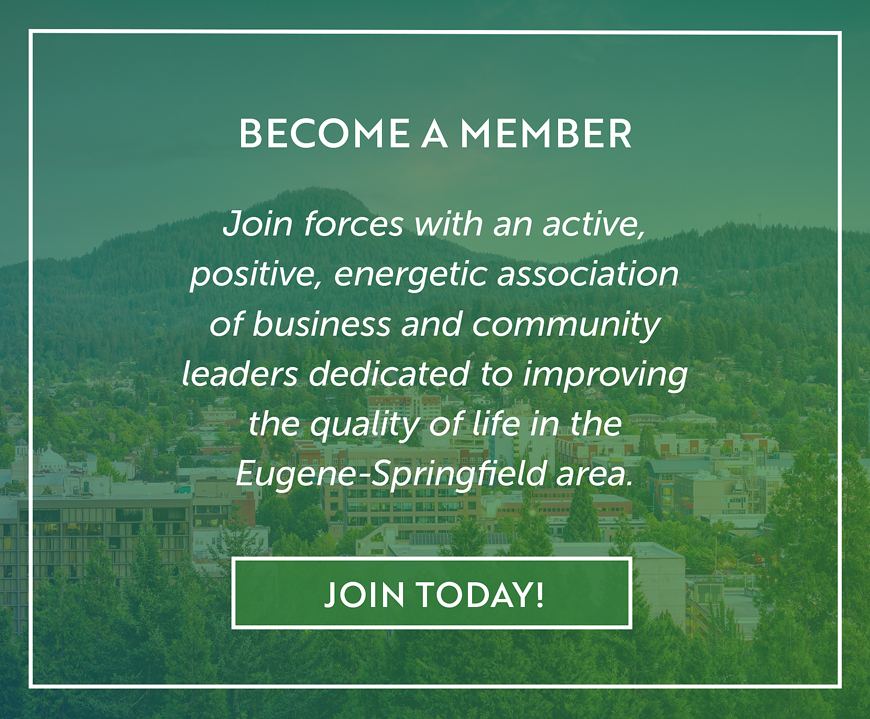
Feature
The Culture of Small: Support, Innovate, Collaborate
article by Samantha Roberts | Director of Marketing and Communications, Eugene Chamber of Commerce
Small businesses may be one of the most important economic drivers within local or national economies. Aside from creating unique products, care for community, and the enrichment they bring to the character of a city, small businesses also employ nearly half of America’s workforce and make up ⅓ of US merchandise exports, according to the US Chamber.
Within Lane County, organizations employing less than 500 employees account for 99.9% of businesses, or over 10,000 small businesses employing many thousands of residents.
Suzanne P. Clark, President and CEO of the U.S. Chamber of Commerce recently shared at the 2023 America’s Top Small Business Summit, “small business owners truly understand what a job means to an individual and a community. It means a steady paycheck, financial security, and support for a family. It means dignity, self-determination, accomplishment, and hope.”
Small businesses are microeconomic hubs, centers of community collaboration, and microcosms of the American Dream in action. The most successful small businesses harness this energy into strong company cultures that inspire, empower, and enable employees – local talent with local dreams – to continue to build on more than just a product line, but an organization that will have a lasting legacy within the community, state, and beyond.
In recent interviews, local employers at companies like Deployed Logix, Hummingbird Wholesale, Threadbare Print House and Design Lab, and Twenty Ideas, share that while small businesses are critical to driving local economies, they are driven by these strong company cultures.
The positive culture of small business is not only a feel-good story: it’s a critical tool in addressing a growing concern- workforce shortages. Among issues like an aging population and conversely fewer coming-of-age employees, as well as changing demographics among employees, experts suggest that by 2060, labor participation will fall to just 60.4% from 61.4% in 2020.
Addressing and supporting strong company cultures within local small businesses is crucial to keeping Lane County’s small businesses thriving in the face of ever-changing demographics, workforce fluctuations, and uncertain national or global politics.
What is Company Culture?
Understanding what the role of culture is in organizational success, and the unique strength which small businesses possess in this arena, requires an understanding of what “company culture” actually means.
While a relatively recent buzzword (according to ForbesAdvisor, references to “culture” in leading business publications jumped from 500,000 in 2019 to over 2 million by 2021), company culture can be very complex. As much a result of concrete policies and traditions, culture is also defined by shared norms, expectations, beliefs and attitudes, and values.
Good company culture can result in less employee turnover, increased productivity, customer satisfaction, employee well-being and participation, and increased safety. Conversely, when a company’s culture does not resonate with its team, hurdles such as disengagement, high turnover, and expensive recruitment can be problematic for organizational sustainability.
Local Lane County businesses from tech to global emergency response, discuss the role company culture has played in their organizations for better, or worse.
Deployed Logix Came with Answers
Founded in 2012, Deployed Logix, or DLX, founders JJ and Katie Urhausen, along with future Partner, Adam Barr, set out to sell great products with a focus on strong company culture.
“We started this company”, shared JJ Urhausen, “because we saw first hand how it was to work in a great company culture that became toxic over time from within. We wanted to found a toxic-free environment where our employees could find balance in work, life, and health.”
Now in its 12th year of, DLX has become a global brand of American-made rapid deployment resources, or “the team behind your team.” Working with organizations like NATO, FEMA, and WHO, DLX has supported rapid response to disasters like Hawaii’s recent wildfires, COVID, and more, all over the world.
“Every individual can find happiness when everything is in balance”, Urhausen shared. “From the beginning, it was about starting a company with a healthy company culture.”
At DLX, company culture was founded upon shared meals, genuine opportunities to connect, innovation, and a shared sense of responsibility. The team started, for instance, a weekly catered lunch ensuring staff wouldn’t have to start the week worrying about what they would eat. Regular parties which also highlight the unique heritage of staff members (many from Mexico or Europe) provide a space to meaningfully intermingle with other departments. “Don’t just hang out with your same friends”, explained Partner, Adam Barr. “We encourage subcultures within each team, but it’s important to mix it up”. Monthly newsletters, which can become an obligatory resource for business information, are sourced with birthdays, celebrations, and announcements about employee “side-gigs” to keep employees engaged and interconnected.
“Katie has said that work should be a safe haven from the difficulties of personal life”, Urhausen described. “It should be an outlet away from the trials at home. There has always been a core running through the company culture of how to take care of people.” For DLX, this has often meant supporting employees who need flexibility for family care, to borrow a company car when their’s breaks down, or in one case – borrow a company conference room for a weekend of Dungeons and Dragons. With a strong undercurrent of boundaries, transparency, and mutual respect, DLX shared their desire to support employees to meet the mission and build a shared sense of responsibility to take care of one another.
This strong focus on company culture is made possible in large part, the founders share, due to their size, processes, and values. “We don’t keep too many layers between employees and leadership”, shared Barr. “Our size allows us to react quickly and communicate well”.
Hummingbird Wholesale Finds Purpose in Employees
Hummingbird Wholesale has been recognized locally as an organization that places a high value on its employees. Winning the Eugene Mayor’s Bold Steps award for their emphasis on the triple bottom line of environmental stewardship, social equity, and prosperity, Hummingbird Wholesale is renowned for its company culture.
Purchased by Charlie and Julie Tilt in 2003, this local small business of less than 50 employees has a bold mission: “We want all of Oregon to be organic”, Production Manager Emma Sackinger shared excitedly. “We know it’s a crazy vision, but you know what, if we can get us a little closer to it, we’re gonna try!”
Hummingbird Wholesale manufactures and repackages organically grown and ethically sourced fruits, nuts, coffee, and more with a set of established core values that guide everything from employee well-being to customer loyalty. “We have a strong culture of continuous improvement”, explained Sackinger, “and a strong culture of service both internally and externally.”
“Hummingbird has historically created engagement in our team by first developing great teams, and then reinforcing that it takes the whole team to do the work”, she says. “The people on the frontlines know how the work can be improved. We’ve grown so much in the last 20 years that we’ve had to break and rebuild our system so many times to support this collaborative culture and sustain into the future.”
This form of company culture is reinforced with weekly connections to review key performance indicators like on-time delivery, inventory, safety, sales, and product quality. Having transitioned towards utilizing processes to manage the workload rather than internal continuity, these check in’s provide clear expectations for each team member, or “coworkers” – the official moniker of each employee. A favorite KPI of the team? The Fun-O-Meter: a weekly survey evaluating how much fun each coworker had the week before and how much fun they expect to have in the following week. This KPI is reported directly to the CEO, Charlie Tilt, who reports the results back to the team. “Once”, shared Sackinger, “a weekly survey came back that many of the team were struggling to make ends meet – not so fun. Charlie immediately implemented a $2/hr raise from the results of that survey.”
Nothing shows the power of Hummingbird’s collaborative culture like the recent transition of the company to employee ownership through the Employee Owned Purpose Trust. This trust supports sustainability of the long term mission and vision of the organization. An uncommon practice, the move demonstrates the role small businesses can play in creating sustainable employment, employee engagement, and financial wellbeing through strong cultural practices and shared values.
Twenty Ideas Leans Into Relationships
When Mike Biglan, Twenty Ideas founder and prior Head of Technology for Marco Polo, moved back to Eugene in 2005, it felt like a risk coming from such a large community of tech innovators. “It felt like a bit of a liability to move back to ‘Little Eugene’”, said Biglan. “But it’s been wonderful to see the change that happens every 5 or so years. It’s great to see people focused on being here as a place to live”.
Founded in 2014, Biglan didn’t hire his first employee of Twenty Ideas until 2015. This small local tech company creates purpose driven products in the health technology and educational industries, while providing solutions to other industries ready to innovate. Biglan explained, “This is an area where it’s fun to create things. The ideation, design, implementation – what can it do? What should the product do? We get to make that a reality”.
The still relatively new firm was recently recognized by Business Oregon as a top 100 place to work in Oregon. Being uniquely primed for remote work, Twenty Ideas is one of only a few local remote-first employers – placing an emphasis on employee feedback and incentivizing remote opportunities. While staying connected can be a challenge, Biglan shares that with being remote-forward, company culture is what pushes the team to connect in unique and innovative ways.
Strong values also provide guiding principles and shared expectations for all 60 employees of this local small business. “What I really find enjoyable is the team of people. It’s fun to work with talented people who enjoy what they’re doing”, he shared. “And yet, how do we improve that? How do we assume we can do better – whether it’s code, operations, or communications?”A culture of excellence, innovation, and transparency (“strong opinions, held lightly”), guide Biglan and his team through projects, transitions, and company building.
Threadbare Print House Rebuilds
Yet, for each example of successful company culture, there belies a journey to get there. Small businesses, while uniquely primed for quick reaction times and personal connections driving positive growth, can also experience the tumultuous effort it can take to get there.
Amy Baker, founder of local print shoppe, Threadbare Print House and Design Lab, shared her poignant experience as she works to refocus her company culture and rebuild a strong team.
“I would describe my company culture as in a transition”, she said. “This past winter my company went through a difficult time that resulted in me losing 6 of my 7 employees.”
“I had thought company culture was in the bag, here. Employees had worked here for several years, I paid them as well as I could, we had parties and went on bike rides…What I had neglected to do was shore up the ship for hard weather.”
After experiencing a financial downturn and needing to cut back employee hours, Baker shared that despite implementing traditional company culture building blocks, she believes she missed an essential component: building employee trust. “All companies big or small experience storms and when the downturns come, communication is essential for setting employee expectations”, she explained.
“I’m working to rebuild a company culture that focuses on a solid foundation”, she said. “Setting company goals that we can all work towards creates a sense of pride in our work. I think a small team of individuals feel ownership over company successes which innately increases work productivity.”
The Not-So-Secret Superpowers of Small Businesses
There’s a certain magic that exists in the reputation of the small business community. Whether it’s a romanticized perspective or reality, there’s a not-so-secret superpower small businesses possess: smaller teams and strong company cultures produce teams of individuals with a sense of ownership not only over the shared success of the organization, but the community in which it lives as well.
“A small business owner knows their employee’s individual struggles and desires,” said Amy Baker of Threadbare., ““And communities must support small business, as the success of a small business extends far beyond the company walls – every town relies on small business to offer jobs that can give employees flexibility, offer creative solutions, and provide a foundation for a healthy work-life balance. As the world becomes more and more integrated with AI and outsourcing”, Baker addedshared Baker, “small businesses are in an important position to take care of the people living right here in our community.”
Small businesses are also chalk full of creative minds making space for big ideas.
“We get mostly referral-based work”, Mike Biglan of Twenty Ideas shared. “Especially with AI, bigger companies don’t know what to do with it yet, where we can dive into solutions”.
“We are grateful for the support and collaboration of small local grocery stores like the Kiva, Capella, and Sundance”, explained Emma Sackinger with Hummingbird Wholesale. “Up and down the west coast, and bulk bins – leaning into partnerships like Emerald Valley Lean Association who help us integrate these practices into our operations and culture”.
“We have a log of all the new ideas that have been suggested to us by employees or customers”, shared JJ Urhausen with Deployed Logix. “It’s not about which ones will bring us the most revenue. We’re asking questions like: which ones do our customers need first? Which ones might save lives? Which idea might lead to more jobs?”
Small Businesses may sport a small size, but they pack a powerful punch in their ability to innovate, collaborate, and support their employees and broader economy. As stewards of local commerce and culture, they embody the essence of resilience, proving that even the smallest endeavors can make a monumental impact on the economic landscape. In Lane County, the power of small is not to be underestimated—it is the very foundation upon which our prosperity thrives.








